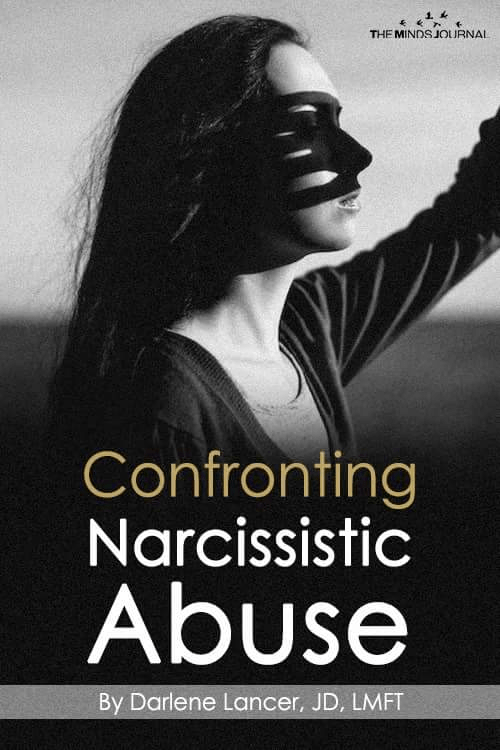We’re all capable of abuse when we’re frustrated or hurt. We may be guilty of criticizing, judging, withholding, and controlling, but some abusers, including narcissists, take abuse to a different level. Narcissistic Abuse can be physical, mental, emotional, sexual, financial, and/or spiritual. How about confronting narcissistic abuse?
Some types of emotional abuse are not easy to spot, including manipulation. It can include emotional blackmail, using threats and intimidation to exercise control. Narcissists are masters of verbal abuse and manipulation. They can go so far as to make you doubt your own perceptions, called gaslighting.
The Motivation for Narcissistic Abuse
Remember that narcissistic personality disorder (NPD) and abuse exist on a continuum, ranging from silence to violence. Rarely will a narcissist take responsibility for his or her behaviour. Generally, they deny their actions and augment the abuse by blaming the victim. Particularly, malignant narcissists aren’t bothered by guilt. They can be sadistic and take pleasure in inflicting pain. They can be so competitive and unprincipled that they engage in anti-social behaviour. Don’t confuse narcissism with an anti-social personality disorder.
Related: Anxiety Disorders Could Be Caused By Being Exposed To Narcissistic Abuse
The objective of narcissistic abuse is power. Narcissists may intentionally diminish or hurt other people. It’s important to remember that narcissistic abuse stems from insecurity and is designed to dominate you. Abusers’ goals are to increase their control and authority while creating doubt, shame, and dependency in their victims. They want to feel superior to avoid hidden feelings of inferiority. Understanding this can empower you.
Like all bullies, despite their defences of rage, arrogance, and self-inflation, they suffer from shame. Appearing weak and humiliated is their biggest fear. Knowing this, it’s essential not to take personally the words and actions of an abuser. This enables you to confront narcissistic abuse.
Mistakes in Dealing with Abuse
When you forget an abuser’s motives, you may naturally react in some of these ineffective ways:
1. Appeasement.
If you placate to avoid conflict and anger, it empowers the abuser, who sees it as weakness and an opportunity to exert more control.
2. This also shows weakness, which narcissists despise in themselves and others.
They may react dismissively with contempt or disgust.
3. Withdrawal.
This is a good temporary tactic to collect your thoughts and emotions but is not an effective strategy to deal with abuse.
4. Arguing and Fighting.
Arguing over the facts wastes your energy. Most abusers aren’t interested in the facts, but only in justifying their position and being right. Verbal arguments can quickly escalate to fights that drain and damage you. Nothing is gained. You lose and can end up feeling more victimized, hurt, and hopeless.
Related: Unraveling PTSD after Narcissistic Abuse
5. Explaining and Defending.
Anything beyond a simple denial of a false accusation leaves you open to more abuse. When you address the content of what is being said and explain and defend your position, you endorse an abuser’s right to judge, approve, or abuse you. Your reaction sends this message: “You have power over my self-esteem. You have the right to approve or disapprove of me. You’re entitled to be my judge.”
6. Seeking Understanding.
This can drive your behaviour if you desperately want to be understood. It’s based on the false hope that a narcissist is interested in understanding you, while a narcissist is only interested in winning a conflict and having the superior position. Depending upon the degree of narcissism, sharing your feelings may also expose you to more hurt or manipulation. It’s better to share your feelings with someone safe who cares about them.
7. Criticizing and Complaining.
Although they may act tough, because abusers are basically insecure, inside they’re fragile. They can dish it, but can’t take it. Complaining or criticizing an abuser can provoke rage and vindictiveness.
8. Threats.
Making threats can lead to retaliation or backfire if you don’t carry them out. Never make a threat you’re not ready to enforce. Boundaries with direct consequences are more effective.
9. Denial.
Don’t fall into the trap of denial by excusing, minimizing, or rationalizing abuse. And don’t fantasize that it will go away or improve at some future time. The longer it goes on, the more it grows, and the weaker you can become.
10. Self- Don’t blame yourself for an abuser’s actions and try harder to be perfect.
This is a delusion. You can’t cause anyone to abuse you. You’re only responsible for your own behaviour. You will never be perfect enough for an abuser to stop their behaviour, which stems from their insecurities, not you.
Related: The Empath And The Wounded Narcissist
Confronting Narcissistic Abuse Effectively
Allowing abuse damages your self-esteem. Thus, it’s important to confront it. That doesn’t mean to fight and argue. It means standing your ground and speaking up for yourself clearly and calmly and having boundaries to protect your mind, emotions, and body. Before you set boundaries, you must:
1) Know Your Rights
You must feel entitled to be treated with respect and that you have specific rights, such as the right to your feelings, the right not to have sex if you decline, a right to privacy, a right not to be yelled at, touched, or disrespected. If you’ve been abused a long time (or as a child), your self-esteem likely has been diminished. You may no longer trust yourself or have confidence.
Be Assertive. This takes learning and practice to avoid being passive or aggressive. Try these short-term responses to dealing with verbal putdowns:
“I’ll think about it.”
“I’ll never be the good enough wife (husband) that you hoped for.”
“I don’t like it when you criticize me. Please stop.” (Then walk away)
“That’s your opinion. I disagree, (or) I don’t see it that way.”
“You’re saying . . .” (Repeat what was said. Add, “Oh, I see.”)
“I won’t talk to you when you (describe abuse, e.g. “belittle me”). Then leave.
Agree with the part that’s true. “Yes, I burned the dinner.” Ignore “You’re a rotten cook.”
Humor – “You’re very cute when you get annoyed.”
2) Be Strategic
Know what you want specifically, what the narcissist wants, what your limits are, and where you have power in the relationship. You’re dealing with someone highly defensive with a personality disorder. There are specific strategies to having an impact.
Set Boundaries. Boundaries are rules that govern the way you want to be treated. People will treat you the way you allow them to. You must know what your boundaries are before you can communicate them. This means getting in touch with your feelings, listening to your body, knowing your rights, and learning assertiveness. They must be explicit. Don’t hint or expect people to read your mind.
Related: Toxic Narcissism in Relationships: Top 10 Warning Signs You’re Being Gaslighted
3) Have Consequences
After setting boundaries, if they’re ignored, it’s important to communicate and invoke consequences. These are not threats, but actions you take to protect yourself or meet your needs.
4) Be Educative
Research shows that narcissists have neurological deficits that affect their interpersonal reactions. You’re the best approach is to educate a narcissist like a child. Explain the impact of their behaviour and provide incentives and encouragement for different behaviour. This may involve communicating consequences. It requires planning what you’re going to say without being emotional.
Related: 6 Telltale Signs Of The Most Toxic Relationship Of All
Get Support
To respond effectively requires support. Without it, you may languish in self-doubt and succumb to abusive disinformation and denigration. It’s challenging to change your reactions, let alone those of anyone else. Expect pushback when you stand up for yourself. This is another reason why support is essential. You will need courage and consistency. Whether or not the narcissist makes changes, you’ll get tools to protect yourself and raise your self-worth that will improve how you feel whether you stay or leave. CoDA meetings and psychotherapy provide guidance and support.
If you’d like more information on narcissism and relationships with narcissists, see www.whatiscodependency.com/blog. Email me if you’d like a copy of a “Checklist of Narcissistic Behaviors.”
Warning: If you’re experiencing physical abuse, expect it to continue or escalate. Get help immediately. Read “The Truth About Abusive Relationships.”
©Darlene Lancer 2017
Written by Darlene Lancer JD, MFT










Leave a Reply
You must be logged in to post a comment.